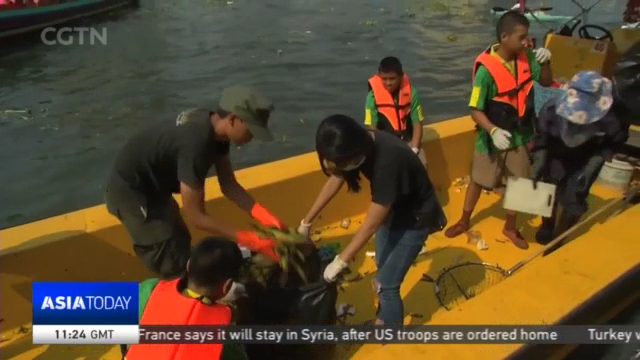
20:11, 22-Dec-2018
Trash in Asia: Kayakers start 14-day journey to collect garbage in Thai river
Updated
19:40, 25-Dec-2018
03:14

A 14-day environmental campaign is underway in Thailand where kayakers are collecting garbage in the country's largest river. Each day, kayakers spend several hours collecting trash from the river, sort them and sell them to a private recycling company. The journey will take them through 10 provinces and end in the Gulf of Thailand. Here's our correspondent Dusita Saokaew with more.
The mighty Chaophraya river. The gateway to the Kingdom and Bangkok's beating heart. Along these banks, it's buzzing with trade and industry- ritzy hotels and new high-rise buildings stand next to riverside housing communities on stilts. Off this river, a system of canals reflects a more traditional Siam, a less-hurried way of life. A quieter atmosphere settles in as the nightmare begins and Bangkok's heart begins to break.
But a team of Kayakers and volunteers are attempting to resuscitate it again with their 14 day journey through 10 provinces where Thailand's major river flows.
STEVE VANBEEA VOLUNTEER "I went down this river 30 years ago and most of the garbage then was vegetables. We wrapped them in banana leave. We didn't wrap it in plastic. I'm amazed where all this comes from."
Under the searing sun, they collect waste from the river by boat and along its banks with nets wearing rubber gloves. Groups of students, government officials, and volunteers lend a hand to collect as much waste as they can as they go through the city's riverside communities before the Chaophraya River empties its mass of floating garbage into the Gulf of Thailand.
DR. PRINYA THAEWANARUMITKUL VICE RECTOR OF THAMMASAT UNIVERSITY "Collecting garbage by kayaking is tools, not the destination. It's the vehicle to the destination. And the destination is not the Gulf of Thailand but to change the behavior of the people."
This 400-kilometre-long "Kayaking for Chaophraya" campaign aims collect trash and urge people to stop dumping their garbage in the river. But it's easier said than done. Practically everything you buy in this country comes in a plastic bag. Shockingly, the average Thai citizen uses 8 plastic bags per day. Unfortunately, most of this and other buoyant materials end up in the open seas.
DUSITA SAOKAEW BANGKOK, THAILAND "Thailand is the world's six-largest contributor of ocean waste. And plastic waste in the country continues to increase at 12% a year. That's around 2 million tonnes. What you see now is the team unloading and sorting through the waste that they have collected in the past couple of hour, hoping that it will draw attention to Thailand's problem with plastic and hopefully increase the nation's environmental consciousness."
That's because Thailand's waterways are vital all Thais- This river flows through the nation's history fueling its culture and traditions. But as population and industrialization continue to grow, more demands will be put on its fragile ecosystems. A fundamental change is needed fast before the country drowns in its own plastic pollution. Dusita Saokaew, CGTN, Bangkok, Thailand.

SITEMAP
Copyright © 2018 CGTN. Beijing ICP prepared NO.16065310-3
Copyright © 2018 CGTN. Beijing ICP prepared NO.16065310-3